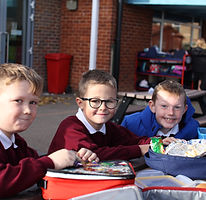Hamstel Junior School
Hamstel Road, Southend on Sea, Essex, SS2 4PQ - 01702 468048
Excellence in Everything
French
French at Hamstel Junior School:
We at Hamstel believe that every child should have the opportunity to learn a foreign language at Key Stage 2 and develop an interest in other cultures.
In our school, we teach French as part of the school curriculum and believe that by learning a modern foreign language our children will be better equipped to learn languages in the future and be part of the global community both socially and in the workplace.
At Hamstel, French is taught in a relaxed and fun atmosphere through a wide array of interactive activities, which focus on children actively participating in lessons and developing the necessary skills and confidence to successfully communicate in the language.
Year 3
In Year 3 children will learn:
-
to recognise the main word classes and start to realise the different genders of nouns
-
to have a basic understanding of the usual order of words in phrases and simple sentences
-
to ask and answer questions and respond appropriately
-
to follow simple instructions and link pictures to key words
-
to join in with repeated sections of songs or stories
-
to recognise some familiar words
-
to remember new words when reading
-
to use mostly accurate pronunciations
Year 4
In Year 4 children will learn:
-
to recognise and use wider range of word classes (pronouns and articles)
-
to use the correct form of an adjective according to the different noun gender
-
to recognise different sentence forms (questions and negatives - the use of the word 'don't)
-
to recognise the meaning of unfamiliar phrase in sentences
-
to begin to work out the meaning of unfamiliar words using learnt clues to ask and answer a range of questions
-
to use familiar sentences and models, make varied adaptations to create new sentences and phrases
-
to read aloud and perform a learned piece using accurate pronunciation
-
to orally use a range of adjectives
Year 5
In Year 5 children will learn:
-
the different forms of some verbs
-
to gain some understanding of extended spoken text
-
to use key sounds to spell topical words
-
to read aloud a short text containing familiar language, using fairly accurate pronunciation
-
to use dictionaries to extend vocabulary on a given topic
-
to express opinions (negative and positive) and reasons in conversation
-
to begin to use different sentence types
-
to write phrase and some simple sentences using adjectives, verbs and word bank
Year 6
In Year 6 children will learn:
-
the different forms of some verbs
-
to read aloud and spell unfamiliar words, using known phonemes
-
to use a dictionary to check spelling of topic words
-
to ask for clarification in basic conversations
-
to create sentences verbally using knowledge of basic sentence structure
-
to express meaning to an audience though intonation and pronunciation
-
to write a range of phrases and sentences from memory and adapt them to write own sentences






